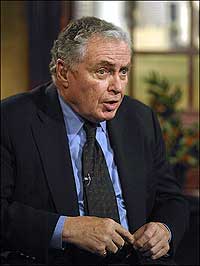Page content
Message from the President
The Laboratory of Experience
Across the nation, history sites and museums report disappointing attendance. Colonial Williamsburg is faring better than many, but we are attracting fewer guests this year than last, and we welcomed fewer last year than the year before. The numbers are cause for self-examination, but not for self-doubt.
Personal safety concerns, health scares, and a sputtering economy are discouraging tourism. A survey Colonial Williamsburg commissioned as the summer began found that 51 percent of the families contacted planned no vacation in 2003. Most cited pocketbook problems; others were worried about terrorism, air safety, SARS, West Nile virus, free time, the economy, and job security. The season's ticket sales proved that they meant what they said.
If there is anything good to be discerned in such a gloomy picture, it is that the outlook should improve as the economy recovers, homeland security strengthens, and public health measures advance. In the meantime, persistent financial uncertainty and the need for sharper operational focus have led to the unavoidable decision to reduce staff for 2004. As discouraging as that is, the foundation's prospects, in the far term and the near, are fundamentally sound. Sixty-one percent of the survey respondents said the nation's historical and cultural institutions are important in their choice of vacation destinations. Donor support of Colonial Williamsburg, for which I remain grateful, has increased significantly in recent years. And essential operational adjustments are resulting in substantial expense reduction.
We do face increasingly vigorous competition, nevertheless, from a wide variety of leisure destinations. There is a school of thought that holds living history museums are losing relevance in the digital age, and that to flourish in this market institutions like Colonial Williamsburg must become more theme-park-like. I do not subscribe to that argument.
Our Historic Area is a bright and engaging restoration of a colonial capital, replete with spirited costumed interpreters, delightful taverns, and lively programs. In our buildings and on our streets, guests participate in the presentation of a pivotal passage in American history. There is an abundance of fun, but a focus on mission: "That the future may learn from the past." Hardly a day passes that we do not examine an idea for improving our offerings, but always recalling that first and foremost, Colonial Williamsburg is an educational institution. Current circumstances do not alter our commitment to that standard.
In his remarkable dictionary, the eighteenth-century's Samuel Johnson defined history as "a narration of events and facts delivered with dignity." That is not to say that history must be stodgy and dull, or that it cannot be related with techniques tailored to the twenty-first century. In history there is beauty, excitement, and entertainment. Amusement is part of the Historic Area experience, an important part, but not in itself an end. It is among the devices we use to tell the old stories in new ways; it is a tool like the Electronic Field Trips, the Teacher Institutes, the Internet, and others employed to connect and keep pace with, as well as to educate, today's audiences.
History is the laboratory of experience, in our case, the American experience. By telling the story of the people and politics of the 1770s, we help our guests understand the time when the catalyst of liberty made of us the country we have become, why representative governments formed from the combinations of individuals, and how the society we value so highly arose from those early yearnings for a new kind of freedom. Through history, we discover new understandings of ourselves and our times. That's our purpose, and I have no doubt about its importance, especially at a moment when America is reexamining itself and its role in the world. Colonial Williamsburg represents not just an eighteenth-century town, but an idea, the idea of America, an idea for all people, for all time.

